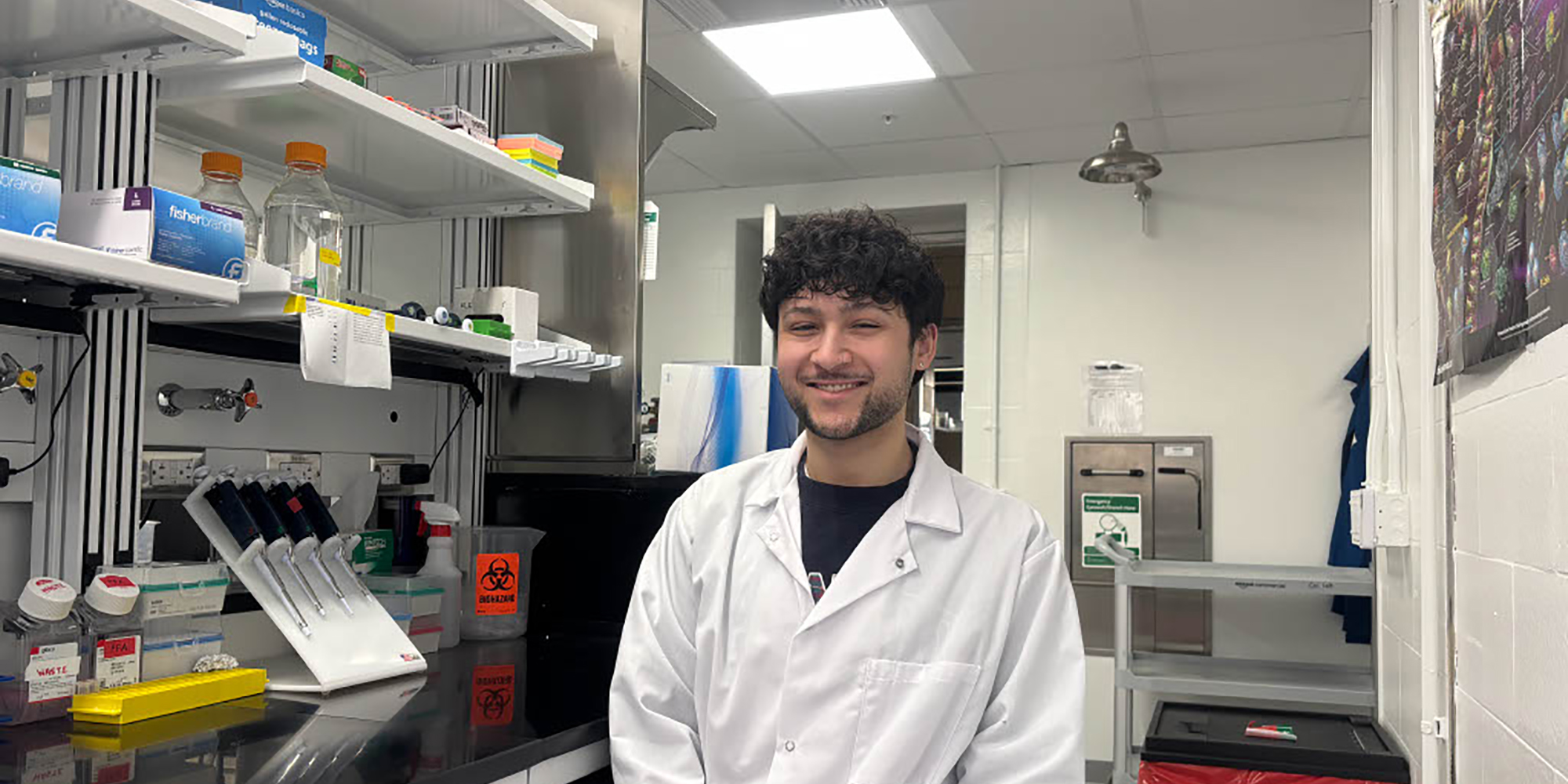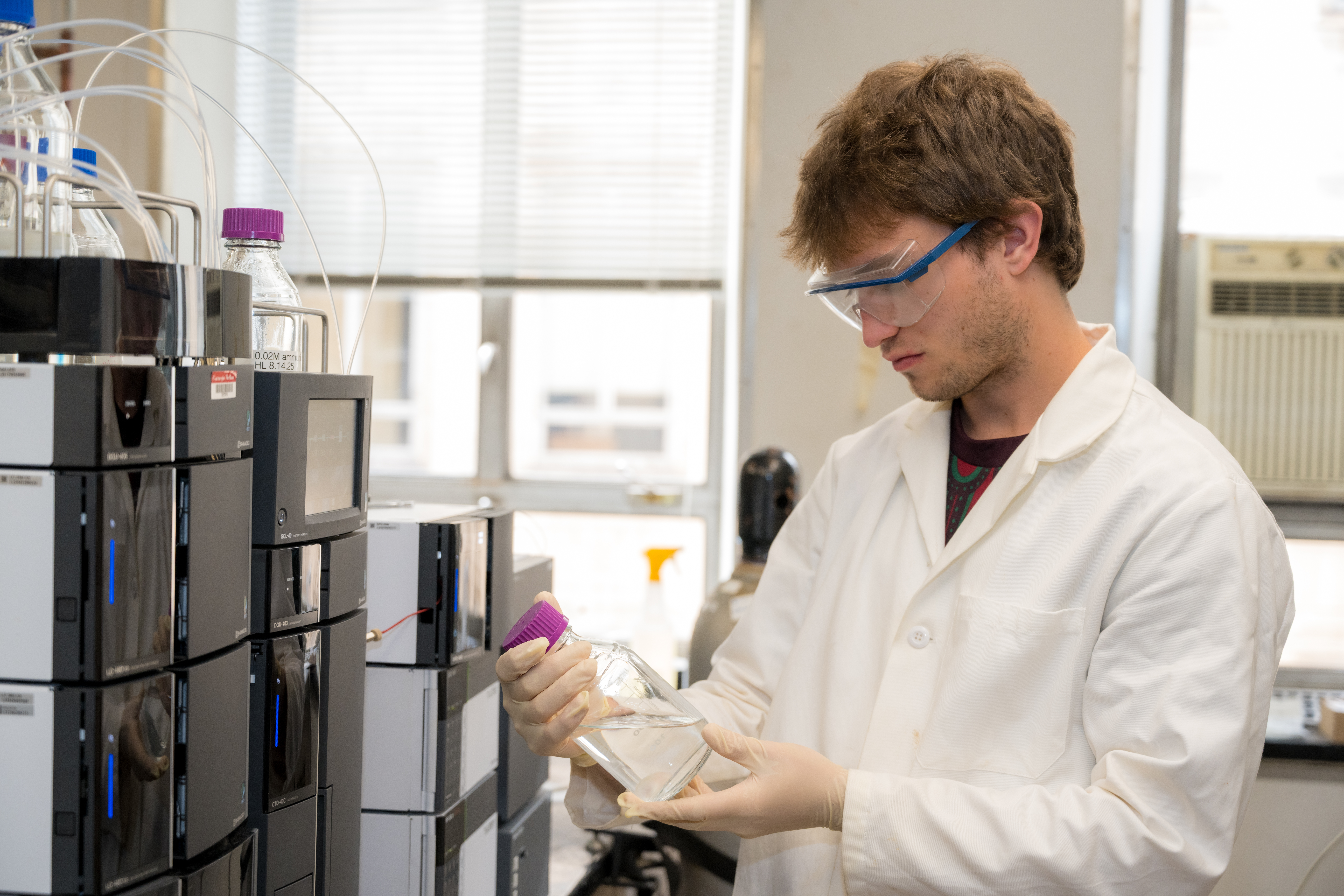

In This Section
CMU Program Helps Students Incorporate Sustainable Learning Environment into Diverse Fields
By Kirsten Heuring Email Kirsten Heuring
- Associate Dean of Marketing and Communications, MCS
- Email opdyke@andrew.cmu.edu
- Phone 412-268-9982
At Carnegie Mellon University, students in the Environmental and Sustainable Studies (ESS) program are confronting climate change, water scarcity and pollution through hands-on research and interdisciplinary education.
From designing sustainable architecture to analyzing water systems in Costa Rica and developing soil safety kits, these students are applying knowledge across science, engineering, humanities and business to create real-world solutions for a more sustainable future.
Designing with nature in mind

Bleona Velic wants to build a more sustainable world, one architectural design at a time.
"When you look at the level of pollution that architecture has historically caused, it's really necessary," said Velic, a senior studying architecture and ESS. "The lessons I've learned from ESS courses have been extremely helpful because they allow me to think critically about sustainability."
For her class project "Wildlife Nexus," Velic designed a culinary institute campus harmonized with nature. Her concept emphasized renewable materials and a landscape rich with native plants for wildlife to thrive. The result was a space where people could learn, create and connect with the environment without compromising the delicate ecosystem.
"When you're approaching architecture from the perspective of environmental consciousness and sustainability, it informs how you're able to design," Velic said. "It's been rewarding to have another lens based on the knowledge I've accumulated with the additional major."
Velic is enrolled in the ESS additional major, a joint program offered by the Mellon College of Science and the Dietrich College of Humanities and Social Sciences.
Sustainability courses connect fields for solving problems
ESS is housed within the Steinbrenner Institute for Environmental Education and Research, which was established in 2004 with a lead gift from CMU alumnus W. Lowell Steinbrenner and his wife, Jan, whose vision and support made the degree a reality.
Neil Donahue, Thomas Lord University Professor of Chemistry and Chemical Engineering and director of the Steinbrenner Institute, said the program provides sustainability courses to students, regardless of major.
"We want the technical students looking toward the environmental humanities," Donahue said. "Likewise, we want the humanities students to really learn something about the underpinnings of the Earth's systems."
Abigail Owen, associate teaching professor of history, directs ESS.
"I'm always thinking about what it is like for an architecture student who cares about sustainability, a mechanical engineering student who cares about creating the next generation of energy technology or a business student trying to understand corporate social responsibility," Owen said. "My goal is to get them to find common vocabulary so they can communicate about these problems."
This begins in the introductory class: Environmental Systems on a Changing Planet. The course is taught by Ryan Sullivan, professor of chemistry and mechanical engineering and associate director for the Institute for Green Science.
"I want students to understand how entirely dependent human society is on environmental systems," Sullivan said. "I ask students for examples of how different disciplines could contribute to understanding or even solving an environmental challenge."
Students dive into water research with real-world impact

Arika Manuel, a senior in international relations and political science with an additional major in ESS, spent a semester at the Monteverde Institute in Costa Rica where she had hands-on experience in analyzing local streams to see which were the healthiest to drink.
"It helped me understand how research is executed, how the results are communicated and how they can be used to inform people in the future," Manuel said.
Keenan Norton, a senior studying chemical engineering with additional majors in ESS and Hispanic studies, also is focused on waterway conservation.
During a Summer Undergraduate Research Apprenticeship — where Carnegie Mellon students earn credit for conducting research with a faculty member — Norton worked with Owen to study challenges that indigenous people in Bolivia and Guatemala face when accessing water. He shared some of that work in an article published in Release Peace.
"The solutions to so many of our problems, particularly environmental problems and problems related to water, are not in advancing special technologies, but rather reverting to the processes that the world uses naturally," Norton said.

Norton said that while implementing water conservation methods won't remove existing pollution in waterways, he also is investigating ways to remove those pollutants. As part of the Institute for Green Science, he works with Terry Collins, Teresa Heinz Professor in Green Chemistry. Collins created catalysts, chemical agents that can accelerate reactions, to remove various chemicals from wastewater.
"These catalysts are designed to mimic natural enzymes that are found in the body to break down the ugly chemicals we see," Norton said. "We've taken that general structure and improved on it to make it really effective in getting rid of all kinds of nasty stuff."
Digging into soil safety

Marcus Lopez, a senior studying biological sciences and ESS, aims to use science to create a more sustainable world, beginning with creating a garden with sustainable practices learned during classes.
Based on what he has learned through ESS, Lopez wants to create a kit for anyone to easily test soil for high levels of heavy metals and forever chemicals with the goal of making sure it's safe to grow fruits and vegetables.
"Pittsburgh is the Steel City, and it's known for a lot of contaminants," Lopez said. "I'm curious to see what analyses I can perform throughout the area and to do something new."
Business meets climate action

As an intern with Carnegie Mellon's Sustainability Initiative, Ameena George, a sophomore studying business administration and ESS, visited the United Nations to discuss their Sustainable Development Goals (SDGs), a list of 17 objectives to reduce human impacts on the environment while improving living conditions across the globe.
"We met with different schools and representatives from the U.N., and we shared what we were doing toward the SDGs and exchanged ideas," George said.
George recently returned from a study abroad experience in Indonesia that focused on climate finance. She met with officials from Indonesian companies that prioritized sustainability.
"I got to see how sustainability and business could work together," George said. "It gave me a more global understanding of sustainability, which was something I was really searching for."
While students can declare the major or minor at any point in their college career, current students and alumni recommend starting early. Kara Scully, an alum of the ESS minor and program assistant at the Steinbrenner Institute, said that beginning sooner makes it easier to apply the concepts learned through the program.
"We're very proud of our curated curriculum," Scully said. "We love the electives we have, and we love our core courses. There's so much our faculty and advisors have to offer, and it's easy to connect with them."
